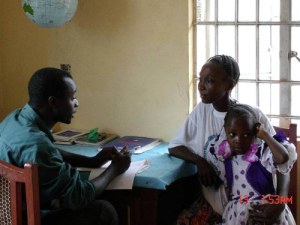
Community paralegals have proved successful in other African countries, such as Sierra Leone. (Photo: Timap for Justice)
(Published in the Saturday Star, 16 February 2013)
HAZEL MEDA
RICHARD “BRICKS” MOKOLO has been a community activist since the 1980s. In those days he fought the apartheid government, demanding it recognise the human rights of all South Africans. But he says his fight is not over.
“After the new dispensation, there are other challenges,” says Mokolo, the Paralegal Coordinator at the Orange Farm Human Rights Advice Centre.
Mokolo believes one of those challenges is access to justice, which is a constitutional right but not a reality for the economically-disadvantaged residents of Orange Farm. Many do not have the money to travel 30 kilometres to the nearest court, which is in Vereeniging, or to pay for private lawyers.
A wide cross-section of stakeholders in the criminal justice system discussed the role of community paralegals like Mokolo at a “Justice for Breakfast” event at Wits University’s Graduate School for Public and Development Management (P&DM) on Wednesday 13 February. The gathering was organised by P&DM and the Wits Justice Project.
Representatives of the Department of Justice, Legal Aid SA, the Law Society of South Africa, the National Alliance for the Development of Community Advice Offices (NADCAO) and other civil society organisations debated the pros and cons of community paralegals.
Robyn Leslie, a researcher at the Wits Justice Project highlighted the successful use of paralegals in other African countries. In Malawi paralegals have assisted hundreds of thousands of people, Leslie said.
Some audience members said community paralegals have an important role to play in alternative dispute resolution, which might relieve the caseload in South Africa’s overburdened courts.
Mokolo said the Orange Farm paralegals provide mediation in domestic violence and unfair dismissal cases.
Ivan Evans of the National Institute for Crime Prevention and Rehabilitation of Offenders (Nicro) said paralegals could help reduce overcrowding in remand centres, by doing something as simple as helping awaiting-trial detainees to contact relatives, who could then provide bail money.
A number of participants in the breakfast dialogue raised concerns about the lack of clarity in the definition and role of paralegals in South Africa, the need for reliable training, and the fact that paralegal activities appear to be unregulated.
The problem of people masquerading as paralegals while charging the public for their services was also highlighted.
Mokolo says he and his colleagues refer people to organisations like the Wits Law Clinic and the Legal Resource Centre where they can consult lawyers for free.
“We are not saying to the people we are lawyers. We are opening doors for them to meet the lawyers.”
Another point of debate was whether community paralegals should be paid professionals or volunteers.
Winnie Kubayi of NADCAO said the work done by community paralegals is time-consuming and that they should be paid for it, adding that a salary and continuous training help to motivate the paralegals. She said her organisation’s salaried paralegals have been providing services to rural communities in KwaZulu-Natal since 1997, with no staff turnover.
Mokolo says the Orange Farm paralegals are volunteers who do the work because of their commitment to community activism.
Nooshin Erfani-Ghadimi, the coordinator of the Wits Justice Project responded to calls for further studies on the issue of paralegals in this country.
“We hope to produce research on the socio-economic and financial benefits of introducing community paralegals into South Africa’s criminal justice system at critical nodes like courts and police stations,” she said.
*Hazel Meda is a member of the Wits Justice Project, which investigates miscarriages of justice.










